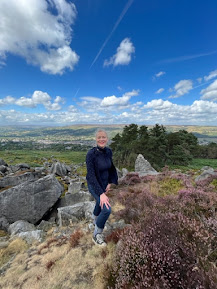The good folk at Ilkley Literature Festival quizzed me about my stint as Apprentice Poet In Residence for this year's festival, which you read on the ILF website here, reproduced below, and they've also published my commission, as mentioned in the text, here.
Not really, but I was first published aged 12 after entering the WH Smith Young Writers’ Competition. I sent in a poem about mashed potato and won a fountain pen.
Who or what has influenced your work?
As part of my French degree, I studied OuLiPo, renowned for ‘freeing literature by tightening its rules’, and my BA thesis and part of my Creative Writing MA was based on Georges Perec, so messing about with words and working with constraints is a big part of what I do.
Which poem or poet do you never tire of reading?
Ever since I was small, I’ve been interested in languages (I’m half Welsh, so maybe that’s why) and how words sound as well as read, and I love Under Milk Wood by Dylan Thomas.
What is your process of writing a poem?
Sometimes I start with a constraint and the poem takes shape (even literally) from there; sometimes a poem develops as a result of research or working on other writing, such as a short story or a piece of nonfiction or creative non-fiction, so the poem is a kind of offcut. Sometimes a poem just arises from an observation or an overheard that fits with something I’d jotted down in my notebook already.
Do you have any advice for someone wanting to write and publish poetry?
Read a lot, write a lot, edit a lot. Listen to other poets at readings or open mics, and share your own work that way as well as through journals and competitions; there are plenty, so find the ones that suit and follow the guidelines. Sign up for workshops and courses – there are quite a few online that are free or not super expensive – and join or set up a writers’ circle to try out new work. It’s very encouraging to get positive feedback but also be prepared to accept criticism, just remember that you have the final decision on what stays and what goes.
During your role, you focused on place writing, what drew you to this practice?
I’ve always been drawn to texts that include places and spaces almost as a character – for example 28 Barbary Lane in Armistead Maupin’s Tales Of The City series – and, as a lapsed sailor, the sea and water are recurring themes in my work. I was inaugural Writer in Residence at Manchester’s Victoria Baths and this year was a resident writer on board the Research Vessel Furor Scribendi as part of the Lancashire Stories project – I’ve contributed a story about Plover Scar lighthouse; I’m also writing about a lock on the River Rhône in France. I’m interested in geography and psychogeography, and in questioning our surroundings, observing the infra-ordinary, and looking for clues in the familiar and unfamiliar, be that urban or rural. This year I’ve also taken part in a Critical Reading Group via The Centre For Place Writing at Manchester Metropolitan University and a symposium, Talking Place.
What did your role as ILF Apprentice Poet in Residence entail?
One of the main features was writing new poetry for a performance during the festival and I was also tasked with running a creative writing workshop, which I called Places and Spaces – our texts took us from Yorkshire in ‘Bridge For The Living’ by Philip Larkin all around the UK, and we looked at pieces by Suzannah V Evans, Padraig Regan, Alice Oswald, Ella Frears and Liz Berry. Along with fellow apprentice Rebecca Green, I judged the Walter Scott Writing Prize and mentored one of the winners, and we hosted two Poet's Corner Reading Group sessions together, discussing pieces by writers who appeared at the festival in 2022 – we covered this year’s Poet in Residence Kayo Chingonyi, Zaffar Kunial, Kim Moore and a previous ILF Apprentice Poet in Residence Andrew McMillan.
What did you enjoy most about your Apprentice Poet in Residency at Ilkley Lit Fest?
Being commissioned to create new work and share it with Ilkley audiences has been a real joy, inviting the audience to join me on a round walk – from the comfort of their church hall chairs – loitering at different landmarks to take in the scene. The opportunity has provided me with the chance to explore the town and the Moor, pour over maps and books on everything from Yorkshire dialect to Barbara Hepworth sculptures, and enjoy keeping lots of field notes, taking photos, pressing flowers and even making some drawings. I’ve also done a lot of writing, exploring some new approaches (including mirroring one of my charcoal sketches in the shape of one of my poems) as well as styles (haiku, for one), and pulling together the poetry map I set out to create.



No comments:
Post a Comment
Note: Only a member of this blog may post a comment.